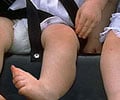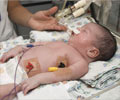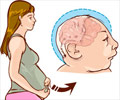Smoking is the root cause to various health problems. But in pregnancy, there are additional birth effects on the baby.

Research has shown the presence of placental anomalies like placenta previa in babies whose mothers are chronic smokers. This decreases the blood supply to the fetal tissues and can cause infant morbidity as severe as brain damage and death.
A study conducted by M.A. Honein et al. showed a positive relation between maternal smoking and fetal anomalies like hydrocephaly (abnormal accumulation of cerebrospinal fluid in the brain), microcephaly (abnormally small head), omphalocele/gastroschisis, oral clefts, polydactyly (extra number of fingers)/syndactyly (fused fingers)/adactyly (absence of fingers), and clubfoot. The study used public natality data from 1997-98 to compare birth defects and some of their predisposing factors. Gastroschisis means protruding of the abdominal contents through the space in the anterior wall without any covering or sac. Omphalocele refers to a protrusion of the same contents enclosed in a sac through a defect in the anterior abdominal wall.
In January 2016, an article was published that evaluated the relationship between trimester-specific smoking patterns in pregnancy and preterm labor. It was found that the risk of early or premature childbirth Ban was significant with smoking in all the trimesters of pregnancy, but an early cessation of smoking before or early during pregnancy lowered the risk of premature childbirth.
Congenital heart defects are the most common types of birth defects and also the leading cause of infant morbidity and mortality. Studies done by researchers showed that maternal cigarette smoking during the first trimester of pregnancy was associated with cardiac anomalies like right ventricular outflow obstruction, atrial septal defects, truncus arteriosus and L-transposition of the great arteries.
Undescended testes in the baby is another condition associated with smoking mothers leading to infertility, testicular cancer and various other additional problems.
Cessation of smoking especially in pregnant women must be a primary goal in order to reduce infant mortality and fetal anomalies. The following steps must be taken to produce this result:
- Advise to-be mothers about the risks of smoking
- Ask history of smoking during every antenatal visit
- Show videos with information on risks, tips for quitting smoking etc.
- Explain methods on how to quit smoking through counseling sessions
- Pregnancy-specific self-help guide may be given
- Follow up twice monthly
Thus, we can conclude that maternal smoking has adverse impacts on the fetus-in-utero and there is a need to educate the masses about these serious health effects an innocent new born might face due to ignorance of their mothers.
References:
1. http://www.ncbi.nlm.nih.gov/pubmed/268260312. http://www.publichealthreports.org/issueopen.cfm?articleID=1086
3. http://www.cdc.gov/ncbddd/birthdefects/features/birthdefects-smoking-keyfindings.html
4. http://www.acog.org/Resources-And-Publications/Committee-Opinions/Committee-on-Health-Care-for-Underserved-Women/Smoking-Cessation-During-Pregnancy
Source-Medindia















